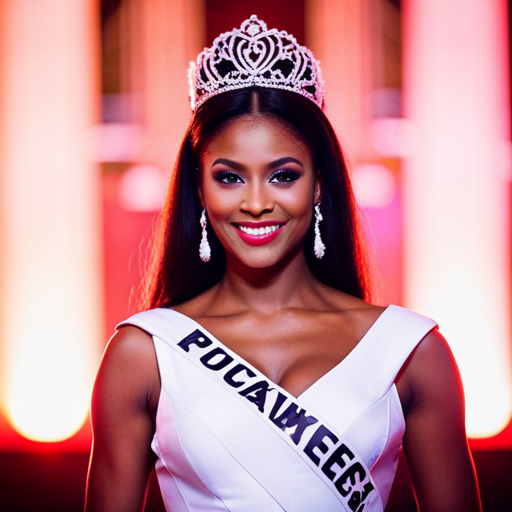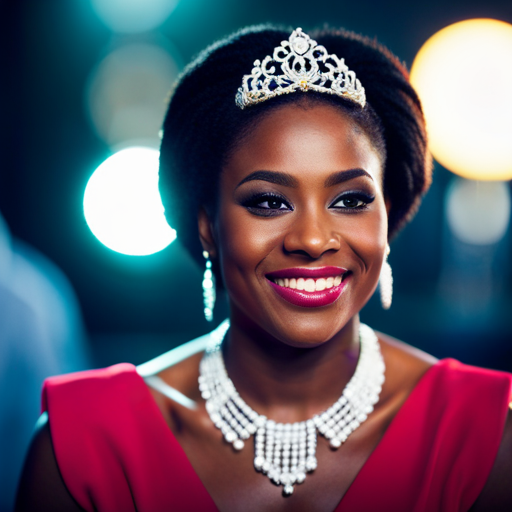The Art of Persuasion in Pageant Competitions

Did you know that 85% of pageant competition success is attributed to effective persuasion skills?
In the world of pageantry, mastering the art of persuasion is crucial for contestants aiming to captivate judges and secure the crown.
From stage presence to Q&A sessions, this article delves into the essential techniques for crafting compelling speeches, leveraging body language, and leaving a lasting impression in pageant competitions.
Mastering Stage Presence
Mastering stage presence is essential for pageant competitors to captivate and engage the audience and judges with confidence and poise. Presentation skills and charisma play a crucial role in creating a lasting impression on the stage. Confidence and poise are the foundation of a strong stage presence. Competitors must exude self-assurance through their posture, gestures, and facial expressions. This not only captures the audience’s attention but also conveys a sense of control and authority.
Furthermore, honing presentation skills is imperative for effective communication. Competitors should articulate their thoughts clearly and eloquently, utilizing body language to complement their verbal communication. Charisma, a magnetic charm and appeal, is another key component of stage presence. It enables competitors to establish a genuine connection with the audience, drawing them into their performance.
Ultimately, mastering stage presence is a continuous process that involves self-awareness, practice, and the ability to adapt to different stages and audiences. By embodying confidence and poise, refining presentation skills, and exuding charisma, pageant competitors can leave a lasting impact on the stage.
Crafting Compelling Speeches
Crafting compelling speeches is a vital aspect of succeeding in pageant competitions.
Speech structure essentials, impactful storytelling techniques, and engaging the audience are key points to focus on.
These elements can help contestants effectively communicate their message and leave a lasting impression on the judges and audience.
Speech Structure Essentials
When preparing speeches for pageant competitions, understanding the essentials of speech structure is crucial for effectively persuading the audience. The power of persuasion lies in the ability to connect with the audience, and this is achieved through effective communication.
Speech structure essentials encompass the introduction, body, and conclusion. The introduction should grab the audience’s attention, establish credibility, and clearly state the purpose of the speech.
The body should present compelling arguments supported by evidence and logical reasoning. Transitions between key points ensure a smooth flow of ideas.
The conclusion should reinforce the main points and leave a lasting impression. Additionally, incorporating rhetorical devices, such as ethos, pathos, and logos, can further enhance the persuasive impact of the speech.
Mastering speech structure essentials is fundamental for delivering impactful and influential speeches in pageant competitions.
Impactful Storytelling Techniques
Effective storytelling techniques are essential for pageant competitors to captivate their audience and leave a lasting impact, building upon the speech structure essentials previously discussed.
Crafting compelling speeches involves incorporating storytelling elements that create an emotional connection with the audience. To achieve this, contestants should focus on weaving personal anecdotes, vivid descriptions, and relatable experiences into their speeches. By sharing genuine and heartfelt stories, they can establish a powerful connection with the audience, evoking emotions and empathy.
Utilizing the art of storytelling allows contestants to convey their messages in a memorable and impactful manner, leaving a lasting impression on the judges and spectators.
This sets the stage for the subsequent section about ‘engaging the audience,’ where we will delve into techniques for maintaining the audience’s interest throughout the entire presentation.
Engaging the Audience
Contestants’ ability to engage the audience through compelling speeches is a crucial aspect of their performance in pageant competitions. To truly captivate the audience, contestants must master the art of charismatic communication and crowd engagement. Here are five essential elements to consider for crafting compelling speeches:
-
Emotional Connection: Establish a deep emotional connection with the audience through personal anecdotes and relatable experiences.
-
Authenticity: Be genuine and authentic in your delivery to build trust and credibility with the audience.
-
Empowering Messages: Deliver empowering and uplifting messages that resonate with the audience’s aspirations and values.
-
Inclusivity: Ensure that your speech is inclusive and celebrates diversity, making every member of the audience feel valued and represented.
-
Interactive Elements: Incorporate interactive elements to encourage audience interaction and create a memorable and immersive experience.
Connecting With the Judges
Connecting with the judges is essential for pageant contestants to effectively convey their personality, intelligence, and confidence. Building rapport with the judges is a crucial aspect of connecting with them. This can be achieved by finding common ground, showing genuine interest in their questions, and maintaining a positive and respectful demeanor throughout the competition.
When contestants express authenticity in their interactions with the judges, it creates a strong connection. Authenticity can be demonstrated through sincere responses, genuine emotions, and a true representation of oneself. It is important for contestants to remember that the judges are not only evaluating their outer appearance but also seeking to understand their inner qualities. Therefore, expressing authenticity in both verbal and non-verbal communication is vital.
This can include making eye contact, using natural body language, and speaking with honesty and transparency. By building rapport and expressing authenticity, contestants can establish a meaningful connection with the judges, leaving a lasting impression that goes beyond just the superficial aspects of the competition.
Leveraging Body Language
Upon entering the realm of leveraging body language, a pageant contestant’s non-verbal cues serve as a powerful tool in reinforcing the authenticity and connection established with the judges. Nonverbal communication, including gestures, posture, and facial expressions, can significantly impact the overall impression a contestant leaves on the judges.
Here are five key elements to consider when leveraging body language in a pageant competition:
-
Confidence: Maintaining strong posture and making eye contact exudes confidence, which is essential for leaving a lasting impression on the judges.
-
Authenticity: Genuine smiles and natural movements can convey authenticity and sincerity, helping to build a strong connection with the judges.
-
Poise and Elegance: Graceful movements and poised gestures can enhance the overall presentation, reflecting sophistication and elegance.
-
Engagement: Using open body language, such as uncrossed arms and facing the judges directly, can signal openness and engagement.
-
Controlled Nervousness: Managing nervous energy through controlled gestures and breathing techniques can project a composed and polished image, even under pressure.
Mastering these persuasive gestures and nonverbal cues can elevate a contestant’s performance, leaving a lasting and positive impression on the judges.
Building a Lasting Impression
Drawing on the mastery of leveraging body language, an essential aspect of building a lasting impression in pageant competitions is the strategic use of verbal and nonverbal communication to convey confidence, authenticity, and engagement with the judges. Impressions are formed not only through appearance but also through impression management, where contestants strategically align their behavior, appearance, and communication style to establish a favorable image. Personal branding plays a pivotal role in this process, as it encompasses the deliberate effort to showcase an individual’s unique qualities and values, thereby leaving a memorable mark on the judges.
Whether it’s maintaining eye contact, exuding poise, or articulating thoughts with clarity and conviction, every interaction during the competition serves as an opportunity to reinforce personal branding and leave a lasting impression.
Transitioning into the subsequent section about navigating q&a sessions, the ability to build a lasting impression lays the foundation for confidently and persuasively addressing questions posed by the judges. Navigating these sessions requires not only knowledge and eloquence but also the finesse of integrating personal branding into one’s responses to leave an enduring impact.
Navigating Q&A Sessions
When navigating Q&A sessions in pageant competitions, contestants must artfully combine knowledge, eloquence, and personal branding to leave a lasting impression on the judges. Answering confidently and gracefully is essential when faced with tough questions.
Here are five key strategies for navigating Q&A sessions:
-
Active Listening: Pay close attention to the question being asked, ensuring a clear understanding before formulating a response.
-
Structure Responses: Organize thoughts coherently, delivering responses in a well-structured manner to enhance clarity and impact.
-
Stay True to Personal Brand: Craft responses that align with your personal brand, reinforcing the image you want to convey to the judges.
-
Graceful Handling of Pressure: Maintain composure and grace under pressure, projecting confidence and poise regardless of the difficulty of the question.
-
Showcase Authenticity: Infuse responses with authenticity and sincerity, allowing genuine emotions and beliefs to shine through.
Frequently Asked Questions
How Can Contestants Effectively Network With Other Competitors Outside of the Competition Setting?
Building alliances and rapport with other competitors outside the competition setting is vital. Utilize networking etiquette and social media branding to connect authentically. Engaging in meaningful conversations, supporting others, and attending industry events can also foster valuable connections.
What Are Some Tips for Maintaining Composure and Confidence During Unexpected Interruptions or Distractions on Stage?
Maintaining focus and handling distractions on stage are crucial for a successful performance. To maintain composure and confidence during unexpected interruptions, it’s important to practice mindfulness, deep breathing, and maintain a strong mental focus.
How Can Contestants Create a Strong Social Media Presence to Enhance Their Overall Image in the Pageant World?
Contestants can build a strong brand and enhance their image in the pageant world by developing a strategic social media presence. This involves creating engaging content, interacting with followers, and showcasing their personality and values authentically.
What Are Some Strategies for Gracefully Handling Difficult or Controversial Questions During the Q&A Portion of the Competition?
In handling controversial questions during a pageant Q&A, maintaining confidence is crucial. Graceful responses demonstrate composure and respect, while unexpected distractions can be addressed tactfully. Preparation, poise, and the ability to steer the conversation positively are essential strategies.
How Can Contestants Continue to Engage With the Judges and Maintain a Positive Relationship Beyond the Duration of the Pageant?
Building rapport with judges post pageant is crucial for networking and future opportunities. Contestants can maintain a positive relationship by expressing gratitude, staying connected through social media, attending events, and showcasing their continued growth and achievements.
Conclusion
In the world of pageant competitions, mastering the art of persuasion is essential for success. From stage presence to compelling speeches, connecting with the judges to leveraging body language, contestants must navigate a variety of skills to leave a lasting impression.
Just like a captivating performance on a grand stage, the art of persuasion in pageants is a delicate dance of charm, confidence, and grace that captivates the audience and leaves a lasting impact.





